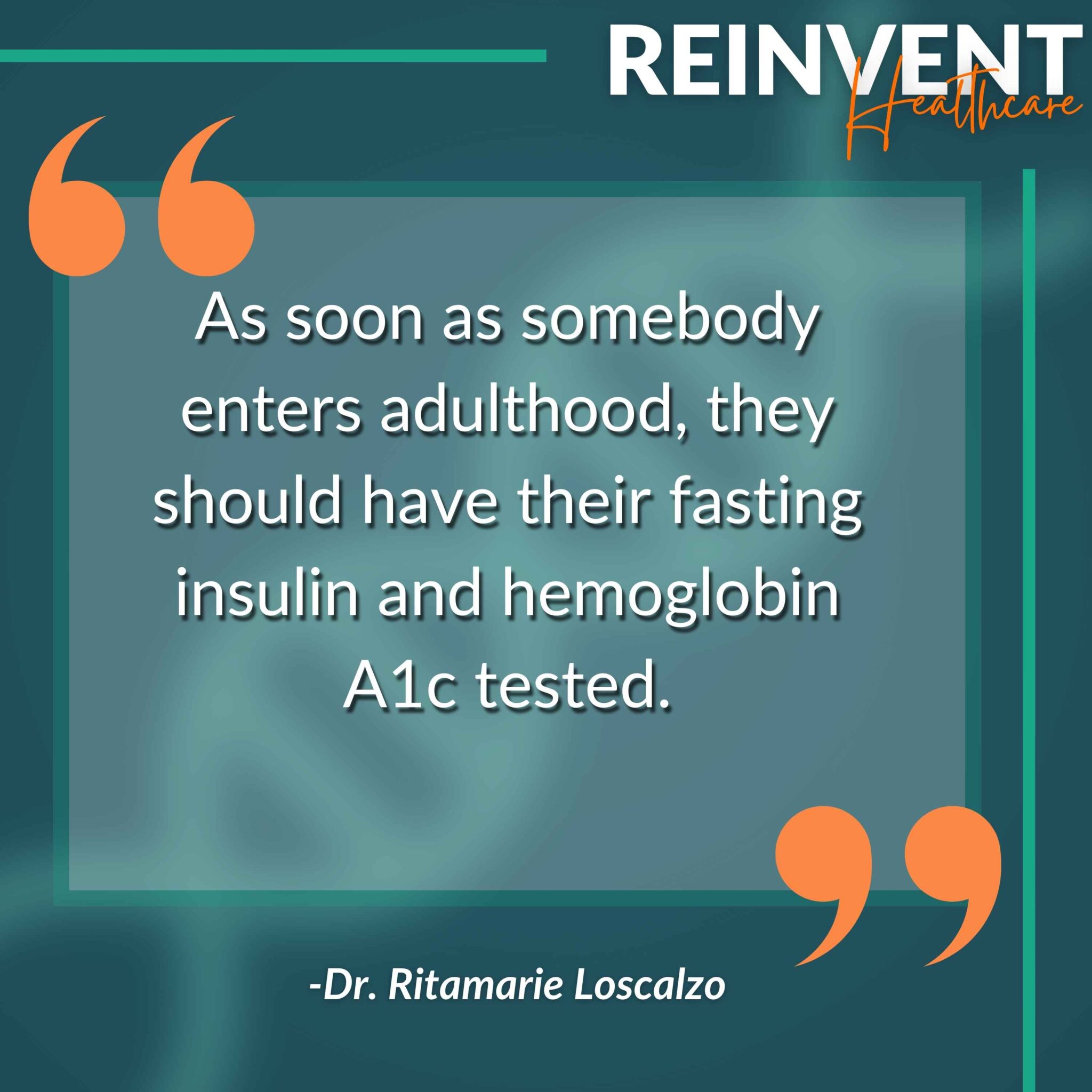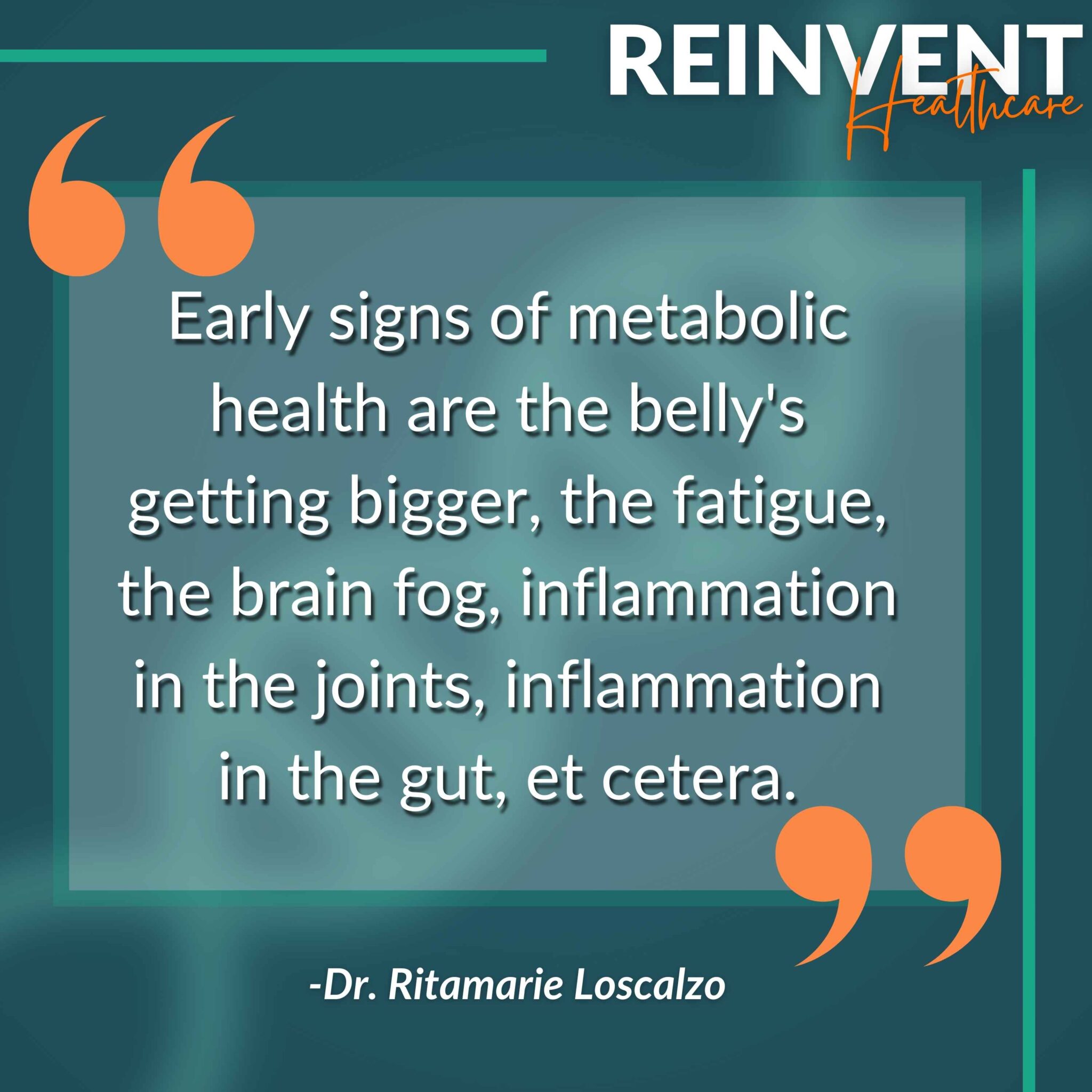What Your Doctor Gets Wrong About Metabolic Health – And How It’s Keeping You Sick
What if everything you’ve been told about metabolic health is outdated?
Most conventional doctors don’t recognize the warning signs of metabolic dysfunction until it’s too late. By the time someone is diagnosed with metabolic syndrome, their body has already suffered years—if not decades—of silent damage. And that’s a problem.
In this eye-opening episode of ReInvent Healthcare, Dr. Ritamarie Loscalzo pulls back the curtain on the most dangerous myths about metabolic health, why the standard tests fail to detect early imbalances, and what YOU can do—whether you’re a practitioner or someone trying to take charge of your own health.
If you’re ready to step beyond the outdated symptom-suppression model and embrace a proactive, root-cause approach to metabolic health, this episode is a must-listen.
What’s Inside This Episode?
- The Dangerous Myth of Metabolic Syndrome – Why waiting until you meet the diagnostic criteria is a health disaster.
- How Standard Lab Tests Fail You – The crucial metabolic markers that most doctors never check.
- Early Warning Signs of Metabolic Dysfunction – The subtle red flags you need to catch BEFORE they turn into disease.
- The Power of Metabolic Testing – Why a true metabolic health panel should be standard for everyone, and what should be included.
- Why Fasting is a Game-Changer – How strategic fasting can reverse metabolic imbalances and prevent chronic disease.
- The Practitioner’s Role in Reinventing Healthcare – How functional testing and early intervention can transform patient outcomes.
Resources and Links:
- See the Full Transcript here
- FREE Guide: The Many Faces of Fasting – Learn how to incorporate fasting into your routine for optimal metabolic health.
- Get Our Free Guide: Magic Questions and Health Detective System – Take your functional health practice to the next level with better patient assessments.
- Join the Next-Level Health Practitioner Facebook Group – Get free resources and community support.
- Visit INEMethod.com for advanced health practitioner training and tools to elevate your clinical skills and grow your practice by getting life-changing results.
- Check out other podcast episodes here
Transcript
Dr. Ritamarie Loscalzo
Welcome back to the podcast. On this episode, we're going to talk about the common misconceptions that conventional doctors have about metabolic health. Metabolic health has gotten so much press lately. People are talking about it. People are talking about the recent studies that the University of North Carolina did that show that 93% of the population is metabolically unwell. 93% of the population. So why is that the case?
Well, metabolic health is the way that the body processes out there and turns it into what's in here, takes the food from the environment and turns it into our cells and turns it into energy. And when we're not doing that effectively and efficiently, we get into all kinds of other health issues, overweight, insulin resistance, cardiovascular, and so much more.
When doctors are taught about metabolic health, they oftentimes equate it to metabolic syndrome, which is an actual diagnosis that occurs when we have fasting blood sugar that's above 100, when we have certain other lab parameters like blood lipids are elevated, cholesterol, LDL, et cetera, low HDLs, when we have blood pressure elevations. And it's like a precursor.
Dr. Ritamarie Loscalzo (1:52)
It's like the “right before you become diabetic” syndrome. And that's what they think about. But really, by the time you get there, you're in trouble. By the time you get to the point where your lipids are out of balance, your blood pressure is out of balance, your blood sugar is out of balance, you've got that extra big roll around your middle that you just can't seem to get rid of, your waist is wider than your hips in men or more than 80% of the hips in women, and that's too late.
And when we look at that, the mistake that doctors are making is when you get to the point of metabolic syndrome with all these other changes, you've already got unseen changes happening. Stiffening of your blood vessel walls, that's obvious. Your cholesterol is up, your blood pressure is up. And then also you've got other issues like retinopathies, damage to the retinas of the eyes, you've got peripheral neuropathies. You've got changes in your kidney function.
If we wait until somebody has full-blown metabolic syndrome, before we advise them on how to turn it around, we're doing our clients and patients a disservice. What doctors need to be aware of is that imbalances in metabolic health underlie almost all of the modern diseases these days. Cardiovascular health, heart attacks and strokes, cancer, autoimmune diseases.
And if we wait until we're way out of balance, we're not going to help people prevent themselves from going down these paths. So if you want to have optimal metabolic health, you need to be aware of signs and symptoms earlier on. The doctors need to be educated that there's signs and symptoms much earlier on than the elevated blood pressure, et cetera, et cetera, that we just talked about. And so I believe that every doctor should be checking people for not just fasting glucose, but postprandial glucose.
We know that fasting glucose is one of the later stage changes in full-blown diabetes. We know that, so somebody could be on the path on the way to full-blown diabetes, but nobody's catching it without testing the proper things on standard blood tests that are really easy and really inexpensive to test. So what can we do?
Well, you take charge. If you're a person interested in getting your health back, as a practitioner, you learn what are the early signs of metabolic health, like the belly's getting bigger, the rest maybe not, the fatigue, the brain fog, inflammation, inflammation in the joints, inflammation in the gut, et cetera. All of these things are a sign that there's something askew, and we should be looking more carefully.
We should be doing a metabolic health panel on people, a comprehensive metabolic health panel, much sooner than after they're showing signs of metabolic syndrome. Much, much sooner.
I think as soon as somebody enters adulthood, they should have their fasting insulin tested, and they should have their hemoglobin A1C tested. If those things look normal when they're in their 20s, maybe you test again when they’re in their 30s, just to make sure that they're staying on track.
I think everybody could benefit from at least one round of getting a CGM, a continuous glucose meter, especially if you're over 30, over 40, because as you head, as women head into menopause and as men head into andropause where the sex hormones are going down, we're seeing a much higher incidence of metabolic imbalances, which then can lead to metabolic syndrome.
So I believe that we as practitioners need to teach our patients and teach our clients how to take charge of their health and get them the proper testing, so we know which direction they're heading, so we can turn them around and head towards metabolic wellness, which is a joy for everybody.
What I find is that most of the practitioners that I see or that I consult with or that I train in our training programs have obviously heard of metabolic health. It's popular these days.
Those who have been conventionally trained and are rooted in the conventional Western medical system are like, they're not really clear about that. So I believe that most doctors are at least aware. Most health coaches are certainly aware, because you can't help but be aware with all the YouTube videos and podcasts and all the press there is about that. You can even see it on some of the commercials on TV.
So we need to educate, the doctors need to be educated that there's something we can do, before it becomes a problem. So when someone is dealing with an autoimmune condition, when someone's dealing with thyroid imbalances, in fact, when somebody's dealing with any diagnosed condition or pre-diagnosed condition, we should be doing a metabolic health panel, because metabolic imbalances are at the heart of just about every modern disease we know about.
It's really, really important. I am passionate and dedicated to training practitioners in the art of identifying metabolic health and cleaning it up and helping people to reduce it, avoid it, turn it around long before it becomes a problem.
So we have training programs. You can check down below and get the link to our site, the INEmethod.com site, where you can learn all about what we can do to train practitioners to get this to be the standard of care. We need this to be the standard of care.
And if you're here, you're a self healer looking to heal yourself. We have a lot of programs, check the links below and hop on a calendar and talk to us about how we can support you in getting to the heart of your conditions.
So if you're looking to improve your own metabolic health, if you're looking to improve the metabolic health of the patients and clients that come to see you, consult with you, and you should be, because it's at the heart of everything. There are a number of things that you can do.
Get tested, absolutely. And I think people should be tested early on. People, as soon as they get their first blood test with their doctor, you know, the annual physical, we should include metabolic health markers in that, because we hear of people, kids, athletes who suddenly have heart attacks, and we didn't see it coming, but we might've seen it coming, had we done a full metabolic health panel, had we been looking at where their blood sugars and their insulin levels are and their inflammatory markers.
Dr Ritamarie (8:40)
Fasting is one of my favorite tools to help people to get their metabolic health back on track. And extended fasting is not for the faint of heart, but it can do wonders for reversing cancer, heart disease, blood pressure problems, et cetera. And you always have to check with your doctor, but for short fasts, intermittent fasts, those kinds of things on a regular basis can help to restore your metabolic health and help you protect you from having metabolic health imbalances.
So I have a really cool guide I put together. It's called The Many Faces of Fasting and shows you how you can incorporate fasting into your regular basis diet, and how you can incorporate fasting into your daily habits.
And how you, as a doctor, as a health coach, as a practitioner, can incorporate this and can guide people to incorporating fasting into their life. We are the future of healthcare. Those practitioners among us who are putting the care back into the word healthcare, and those of us who are dedicated to replacing the outdated symptom suppression model and the disease management model.
I've dedicated my life to empowering people to take back control of their health and to supporting health practitioners to truly help people to get to the underlying root causes of their issues.
If you'd like more in-depth training and resources to take your practice to the next level, download our free guide to Asking the Right Questions at www.inemethod.com. We welcome you to join us in the movement to reinvent healthcare. And until next time, shine on.








